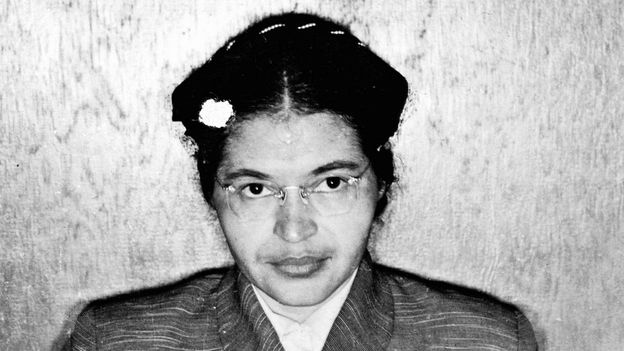(Picture credit score: Getty Pictures)
On December 1, 1955, Rosa Parks was arrested in Montgomery, Alabama, for refusing to surrender her bus seat to a white passenger. In these unique BBC clips, uncover how her brave act of defiance set in movement a sequence of occasions that ended segregation within the US, however at the price of Parks himself.
O
On a winter night in 1955, a 42-year-old African American lady named Rosa Parks, drained after a protracted day of labor as a seamstress, boarded a bus in Montgomery, Alabama, to go dwelling. She paid her fare and took an empty seat within the ‘coloured’ marked part of the bus.
Fifty-five years earlier, Montgomery had handed a legislation that segregated bus passengers by race. The entrance of the bus was reserved for white residents, the rear seats for black residents. But it surely had additionally develop into frequent for bus drivers to order a black passenger to surrender his seat if there have been no “white solely” seats.
Extra like this:
– The 1968 picture that shocked the world
– The ‘alien invasion’ that fooled the US
– How Mickey Mouse saved Disney from destruction
Because the bus crammed up, bus driver James Blake demanded that she and three different black passengers quit their seats. Solely Rosa Parks refused.
“I did this as a result of I felt like I used to be being violated as a human being. I had a tough day at work, [I was] each bodily drained and mentally irritated. I used to be bored with these sorts of issues that we needed to endure as a individuals due to our race,” she later mentioned in an interview with the BBC.
Rosa Parks to BBC: ‘After I refused to maneuver, he had me arrested’
The results had been swift. The bus was stopped and Parks was instantly arrested by native police. On December 5, she was discovered responsible of violating segregation legal guidelines, given a suspended sentence and fined $10, plus $4 in court docket prices.
The arrest was not an remoted occasion, however a consequence of Jim Crow legal guidelines, laws meant to codify racism and marginalize Black Individuals. The legal guidelines managed almost each facet of every day life, denied Black Individuals the precise to vote and mandated the segregation of faculties, restrooms, public transportation, and eating places.
This wasn’t the primary time somebody was arrested for refusing to surrender a seat to a white passenger. 9 months earlier, the identical factor had occurred to 15-year-old Claudette Colvin. However this time, the act of silent resistance proved to be a catalyst for change.
Punished for her braveness
Parks’ outwardly calm look belied the truth that she was a veteran activist who had served as secretary of the Montgomery chapter of the Nationwide Affiliation for the Development of Coloured Individuals (NAACP). After her arrest, a boycott of town’s bus system was organized by the Montgomery Enchancment Affiliation, led by a 26-year-old preacher named Martin Luther King Jr.. The boycott lasted for greater than a yr, crippling the general public transportation system with misplaced income, and put a nationwide highlight on the systemic racism inherent in Jim Crow legal guidelines.
In the meantime, Parks’ case was making its method by means of the authorized system. It will definitely reached the U.S. Supreme Court docket in December 1956, which dominated that bus segregation was unconstitutional.
However Parks was punished for her braveness: she misplaced her job on the division retailer within the aftermath of the boycott, and she or he acquired demise threats throughout the authorized proceedings.
In historical past
In Historical past is a sequence that makes use of the BBC’s distinctive audio and video archive to discover historic occasions that also resonate immediately
The yr after the Supreme Court docket ruling, she and her husband, who additionally misplaced his job, moved to Detroit to flee the fixed harassment.
Within the years that adopted, they each struggled to seek out work attributable to a backlash attributable to her shut involvement within the boycott. She was additionally plagued with well being issues and medical payments. Regardless of this, she remained deeply concerned within the battle for civil rights and campaigned for honest housing and voter registration in Detroit. She volunteered for native Democratic candidate John Conyers in his bid for Congress, who, when elected, employed her as his assistant in his Detroit workplace, a place she held till her retirement.
Unique interview with Rosa Parks: ‘I used to be abused’
The affect of Rosa Parks’ arrest went far past simply ending racial segregation on public transportation. Her quiet power within the face of racism galvanized the black neighborhood and laid the inspiration for civil rights campaigns, together with the historic March on Washington in 1963 and the eventual passage of the Civil Rights Act of 1964 and the Voting Rights Act of 1965.
“I feel if there’s only one level, one occasion within the civil rights motion that began within the Fifties, you may credit score the Montgomery Bus Boycott and Miss Parks… which was symbolized by this courtroom and her perception in it,” says Fred . Grey, Rosa Parks’ lawyer within the BBC interview.
Her refusal to surrender her seat fueled the momentum of a mass motion that will in the end dismantle racist segregation insurance policies. And he or she herself turned an emblem of the wrestle for justice and equality.
In 1999, the US Congress awarded her its highest award, the Congressional Gold Medal, calling her “the mom of the civil rights motion.”
In Historical past is a sequence that makes use of the BBC’s distinctive audio and video archive to discover historic occasions that also resonate immediately.
In case you favored this story, join the e-newsletter of The Important Listing – a hand-picked choice of options, movies and unmissable information, delivered to your inbox each Friday.
;

